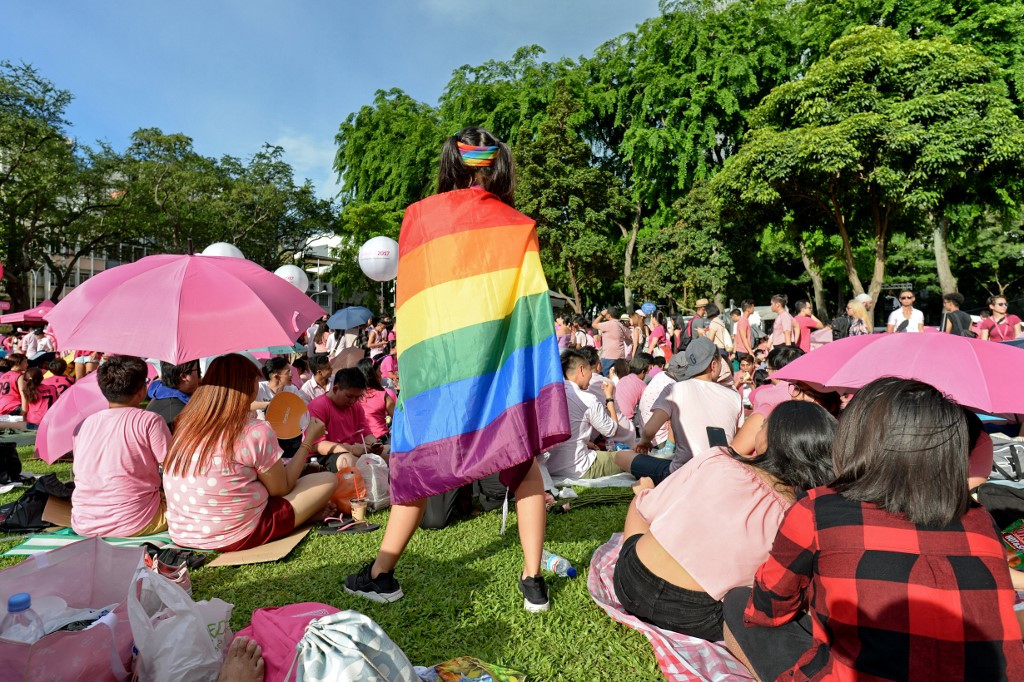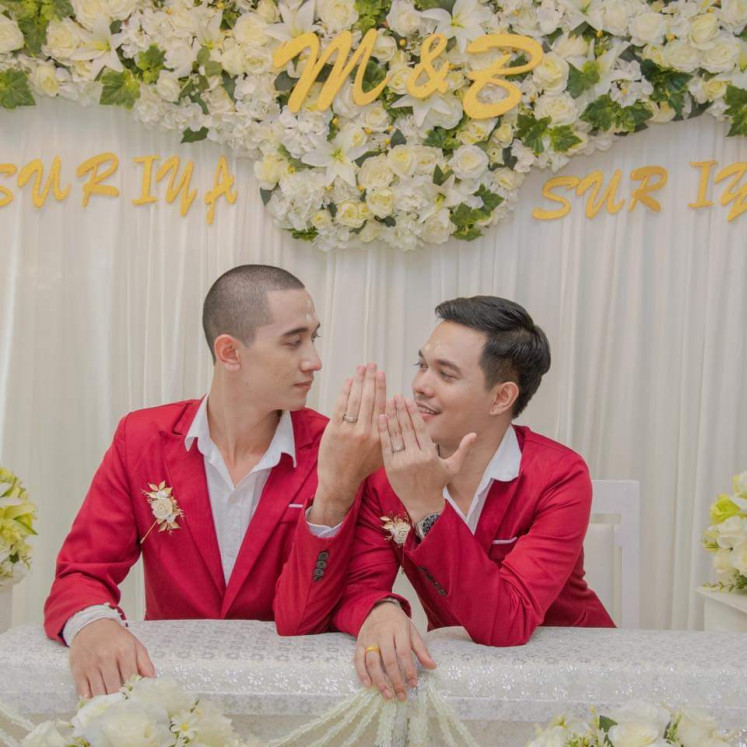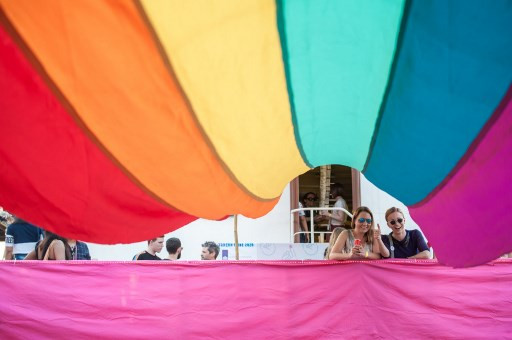ASEAN identity in focus after flame war
As Indonesia's notoriously mean netizens bullied and harassed a same-sex couple from Thailand on Facebook, critics interrogated Indonesia and its place in the ASEAN project to construct a "common" regional identity.
Change Size

I
ndonesia’s netizens have once again lived up to their reputation as the most ill-mannered in all of Southeast Asia, after a recent display of homophobic commentary devolved into an all-out flame war with Thai internet users.
But the incident also casts a long shadow over the regional project to construct a “common” ASEAN identity, as well as Indonesia’s traditional role in leading the way.
Thai national Suriya Kertsang, 28, and his 24-year-old partner Suriya Manusonth have been at the receiving end of obscene and degrading comments online by strangers from Indonesia, ever since they posted pictures of their celebration of union on Facebook on April 4.
It did not take long before the online bullying turned into a cross-border mud-slinging fest tinged with homophobia, Islamophobia and jingoism.
As of Thursday, the couple’s wedding photo album on Facebook had turned into an online battlefield, with over 445,000 comments and 40,000 shares.
The rude attitude and mob mentality of Indonesia’s netizens has already gained global notoriety, after Indonesia placed 29th out of a list of 32 countries on Microsoft’s latest Digital Civility Index released earlier this year. The online backlash that Microsoft received for its study only confirmed the findings.
In contrast, Thai netizens ranked 19th on the index, while Malaysia’s internet users, with whom Indonesians are most often embroiled in cyberspace brawls, ranked 10th.
Read also: Thai LGBT couple speak out against Indonesia's online bullying
Culture shock
Senjaya Mulia, founder of the Southeast Asian networking platform ASEAN Youth Organization (AYO), has seen it all. Over the last decade, Indonesia’s social media users have always been picking fights with foreigners, he said.
The activist noted how Indonesian netizens tended to pick fights with Malaysians over cultural issues, with Filipinos over the economy and with the Burmese over the Muslim Rohingya minority.
“AYO has been using social media since 2011, which was for us the dawn of Facebook and other social media platforms. Back then, almost every day our team had to intervene in netizen brawls taking place on our accounts,” he told The Jakarta Post on Tuesday.
Senjaya attributes this behavior mostly to culture shock, and that in the latest row with Thai netizens, the debate revolved around Indonesians’ unfamiliarity with LGBT visibility in Thailand.
“Netizens [of different countries] are not familiar with each other and they are quick to judge,” he said.

At a glance, Thailand’s deep cultural history with gender fluidity, as well as its people’s relaxed attitude toward LGBT rights and visibility, can be seen as opposite to the views of largely conservative Indonesians.
Although same-sex marriages, civil unions and domestic partnerships are not yet legally recognized in Thailand, many from the global LGBT community have flocked to the country to consummate their union. Currently, a bill to legalize same-sex partnerships is still in consultation.
In contrast, the union of marriage in Indonesia is by law only between a man and a woman, which is also widely accepted across religious beliefs. The LGBT community in Indonesia still faces many legal hurdles and prejudices. For some, the discrimination can even be life-threatening.
At the formal level of regional cooperation, however, and particularly in the context of ASEAN, of which Thailand and Indonesia are founding members, such contrast between lived experiences is not always readily visible.
Read also: Survey on acceptance in Indonesia gives hopes to LGBT community
Common identity?
The homophobic online debate has cast doubt upon the “people-centered, people-oriented” ASEAN community building project, which aims to unite the hugely diverse region under a common Southeast Asian identity.
According to The Narrative of ASEAN Identity, a guiding document issued late last year at the ASEAN summit chaired by Vietnam, the centuries-long acculturation process in the region has “facilitated the evolution of a pluralistic community that is not only adaptable and resilient but also appreciates and respects diversity".
One ASEAN diplomat said the Narrative aimed to strengthen peoples’ sense of belonging and the “we feeling” from the ASEAN community.
But some observers suggest it is not enough to construct a pan-regional identity based on shared interests and historical experiences, especially when unseen differences are not addressed, in spite of the accessibility of the internet allowing netizens from different cultures to meet.
“Identity is a contesting process; we may find our culture more diverse than before due to acculturation, but that does not necessarily mean that people have learned to accommodate differences,” said Dr Michelle Tsai, a scholar of economic anthropology, consumer culture and identity politics at the National University of Singapore.
“The tensions caused by such unresolved differences signal that [there is] still much to be done and much to be learned in society with regard to what is meant by appreciating and respecting diversity,” Tsai told the Post in an email interview on Wednesday.
Lini Zuria, an advocacy officer for human rights activist network ASEAN SOGIE Caucus, explained that even the diversity of gender identities and sexual orientations was something that had been passed down for generations across all of Southeast Asia, way before modern nation-states were formed at the end of the colonial era.
“Cross dressers, for instance, not only can be found in Indonesia, but also in Thailand, Cambodia, the Philippines, Malaysia, Vietnam and Laos. These are very old traditions, and ASEAN calls them inherited values in the document that was issued at the summit last year,” she told the Post on Friday.
“Even so, we know that ASEAN has a hand in erasing and even criminalizing the diversity of this tradition.”
Read also: ‘Hugs Not Hate’ campaign to tackle homophobia in SE Asia

Significant voice
For Indonesia, the region’s largest nation and one that prides itself on being the de facto leader of ASEAN, the online harassment scandal and its rejection of the LGBT community may not necessarily bode well for leadership.
Lini said that cross-border displays of homophobia on the internet have become more frequent in recent times, especially between netizens of Malaysia and Indonesia.
For instance, she noted that the social media backlash for the Malaysian Women’s March in 2019 was set off by an LGBT group who joined – vile comments from Indonesian citizens ensued.
“Just from these situations, we are not shocked to see that Suriya and his partner became victims of hate speech; this is merely a reflection of the fact that homophobic behavior is not confined to national borders,” she said.
“It is a bit odd, however, seeing comments like, ‘If you want to be LGBT then do it out there, don’t do it here [in the country]’, when they are obviously still full of hate for LGBT people who are not Indonesians.”
As word of the online harassment scandal was picked up by media outlets and at least one prominent Thai rights campaigner came to the couple’s defense, more sympathetic members of Indonesia’s large internet user base – amounting to nearly half of the 270 million population – started to apologize on behalf of the nation.
By Wednesday afternoon, the social media hashtag #Indonesiasaysorryforthailand became a trending topic on Indonesian Twitter and even made its way onto the Thai couple’s Facebook posts. Many Indonesian social media users expressed their regret and embarrassment for the nasty comments that were made.
Michael N. Budiarto, the head of partnerships and international relations at AYO, said his organization believed the online quarrel was a misunderstanding. “Gender is a social construct, and therefore its meaning is created and shared among the community,” he told the Post in an email on Friday.
“In this case, a misunderstanding transpired between Indonesians and Thai in the social media. AYO believes that in order to form a solid regional identity, the citizens of each state should practice tolerance and should respect each others’ insights on the issue.”









